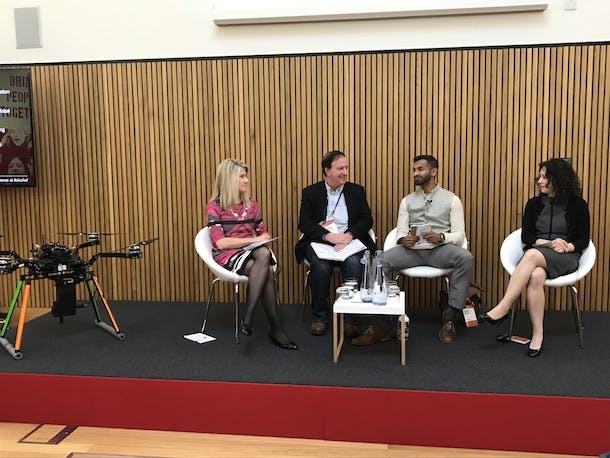
Introducing a song he was about to play with a group of musicians from around the world, Kinan Azmeh, Syrian clarinetist and member of the Silkroad ensemble, said, “I would like to dedicate this piece to all the Syrians who managed to fall in love in the last six years. I find it quite, quite inspiring that in spite of all the bullets, the barrel bombs, and even chemical attacks, people have the resilience in themselves to fall in love…It seems to me that maybe falling in love is one of the very, very few human rights that no authority can take away from you.” For the audience at the 2017 Skoll World Forum – made up of change makers working for human progress – Azmeh’s words of hope offered a simple, and profoundly powerful truth: even amidst tragedy, violence, and loss, the human spirit can, and does, prevail.
Azmeh and his fellow Silkroad musicians played and spoke at the closing session that wrapped up four days of conversations designed to find and create common ground in a world increasingly defined by divisions and fault lines. The Forum asked the important question, “Can we design a world where our common humanity outshines our ideological, cultural, and political differences?” and responded with the promise that together, participants would “give rise to new ideas, new perspectives, and ultimately, new relationships built on trust and mutual desire for human progress.”
The impressive gathering of innovators lived up to its ambitious promise, giving me many reasons to be hopeful that we can indeed find common ground and work toward a shared vision for a better future. In fact, the discussions at the Skoll World Forum reminded me of our work at the UN Foundation bringing partners together in support of the work of the United Nations.
Here are three reasons for hope I picked up at Skoll that will stick with me:
The creativity of the community – I’ve worked in this field for a long time, and I continue to be impressed that the people taking on the world’s big challenges seem to have endless creativity. During the opening plenary session, World Bank Group President Dr. Jim Yong Kim spoke on how the World Bank is working with the systems of finance to lift up the world’s poorest and leveraging the instruments of insurance to prevent pandemics. Skoll Awardee Dr. Rajesh Panjabi of Last Mile Health explained how his organization developed a system in Liberia for reaching those who live more than an hour’s walk from the nearest health clinic. The model was so successful it was ultimately adopted by the government, which is now able to reach 1.2 million additional Liberians with health services. Hamdi Ulakaya, Founder and CEO of Chobani, and honoree at the 2015 UN Foundation Global Leadership dinner, shared the inspiring story of how the company first began hiring refugees. Visiting a refugee center about 30 miles from the Chobani plant, he found out the main barriers to employing people there was that they did not have cars, they were unexperienced in the work, and English would be a challenge. So he provided transportation to the plant, training, and translators. Now, Chobani employs refugees from 19 different countries.
The use of data for better results – The focus on effective use of data is driving better outcomes in many issue areas. In accepting a Skoll Award, Bradley Myles of the Polaris Project explained how his organization has analyzed years of data from collected on human trafficking, finding that there are 25 different types of trafficking. This new understanding – reached through data – will enable Polaris to build specific approaches for addressing each type. Atul Gawande, Director of Ariadne Labs, showed us how leveraging data to improve health care systems can vastly improve outcomes for patients. Ariadne Labs conducted a study in the largest state in India to test the effects of teaching safe birth techniques, and found dramatic improvements. The approach is now being used in 30 different countries.
The focus on the Sustainable Development Goals – I was surprised how many people I met at the Forum who were not only familiar with the Sustainable Development Goals (SDGs), but know exactly how their work is connected to the SDGs and consider themselves passionate advocates for SDGs progress. In a session focusing on these global goals, the speakers included a for-profit company, Biocarbon Engineering; an official from the Canadian government; and non-profit, Namati – a good reminder that players from all sectors are focused on the SDGs. That’s important, because we only have hope for reaching these ambitious goals if we have collaboration across all sectors. The comment I heard most frequently from fellow attendees was urging me to make sure the UN Foundation continues working to increase awareness of the SDGs and to keep helping companies and organizations deepen their engagement in helping realize the goals.
With the challenges facing our world today, social, economic, and political divisions can make it even more challenging to find and implement solutions. But the Skoll World Forum served as a good reminder that there are many reasons to believe that there is common ground in our hopes for the future, and working together with good information and creativity, we can make progress in shaping that future.



 View All Blog Posts
View All Blog Posts